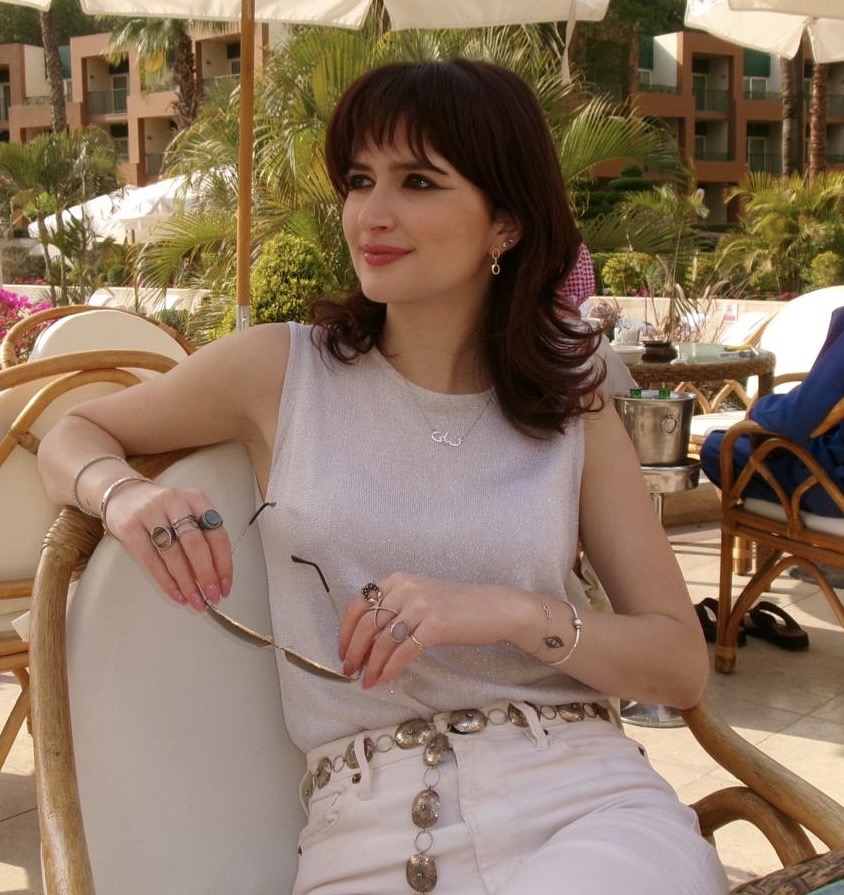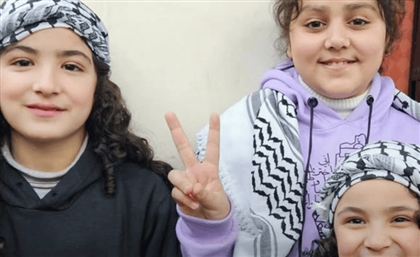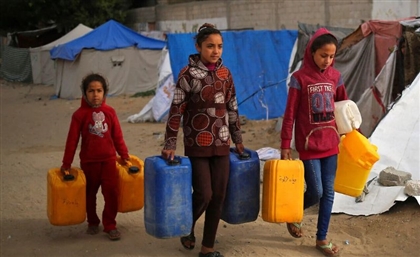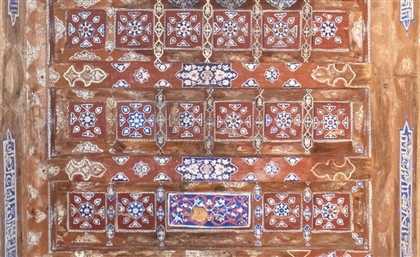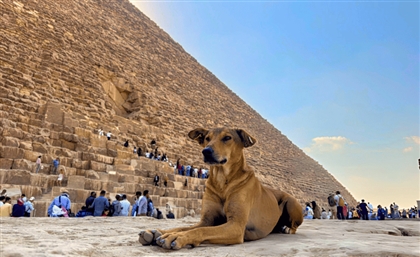Gaza's Edward Said National Conservatory Plays Through Genocide
Amid famine, bombardment, and displacement, dedicated teachers at the Edward Said National Conservatory of Music continue to teach children music in northern Gaza.
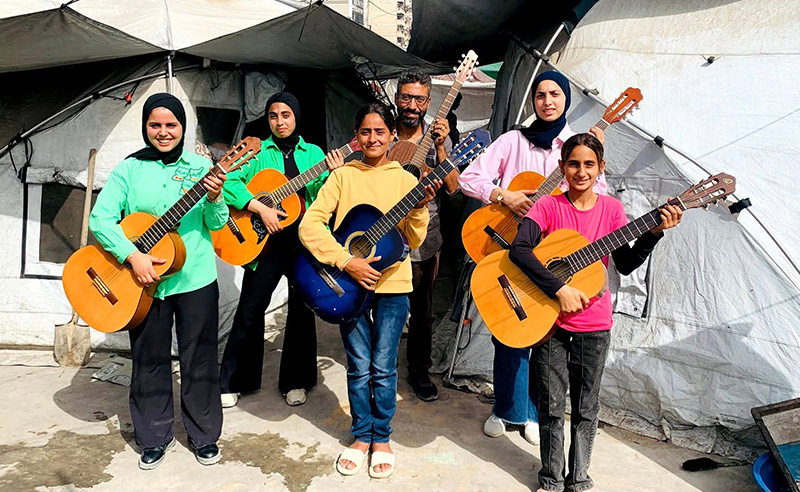
Music teacher Ahmed Abu Amsha addressed Facebook on July 29th, 2025, from Gaza City. Behind him, men, women, and children sat in a circle below white tarps, surrounded by makeshift tents.
“Until now, we don’t have food, we don’t have anything to survive,” he said in English.
Abu Amsha's colleague at the Edward Said National Conservatory of Music (ESNCM) and fellow music teacher Ismail Daoud repeated the words in Arabic. “We are living under famine,” he continued. It was on this day that the Integrated Food Security Phase Classification (IPC) stated, via the World Health Organization, that the “worst-case scenario of Famine [was] now unfolding in the Gaza Strip.”
Ismail looked into the camera. “This is our message to the world.” Ahmed raised a tin dish, and began to drum. Dum, dum, dum, dum. After a few beats, the circle repeated his rhythm. Some used pots, some used trays, some used spoons instead of their hands.
“We are musicians who carry peace on the strings of our instruments and sing in the face of hunger and destruction,” the Facebook reel’s caption read. “Our bodies are exhausted, our voices fading, but our hearts still beat with hope. We call on every musician around the world, every human with a heart: Help us survive. Help us keep the music alive under the rubble.”
Facebook This summer, ESNCM held summer programs in refugee camps and inside the buildings that are still standing in northern Gaza. The organization posted videos and photos on their nearly every day, taking viewers into physical classrooms where students learned the guitar at Gaza College, and outdoor classrooms between tents, where the crowd clapped up the scales of ‘do re mi’.
ESNCM was originally founded in Ramallah in 1993 as the Palestinian National Music School. In the wake of renowned intellectual, scholar, and pianist Edward Said’s death, they changed the name in his honor. The conservatory opened its Gaza branch in 2012, taking over the A. M. Qattan Foundation’s ‘Gaza Music School’ that premiered four years earlier. ESNCM had already added Jerusalem, Bethlehem, and Nablus centers. Across Gaza and the West Bank, their mission has always been to strengthen Palestinian identity through music, a vision that resonates poignantly, and urgently, in the face of genocide.
Before October 7th, 2023, the Edward Said National Conservatory of Music (ESNCM) was located in the southern Gaza City neighbourhood of Tel al-Hawa. They partnered with UNRWA schools and local organisations to offer Palestinian youth music programs across multiple levels, and even sent students abroad to perform with the Palestine Youth Orchestra. In October, Israeli forces bombed the conservatory, on the ground floor of the Red Crescent ambulance building, with a direct artillery shell.
According to an article on ESNCM by the Institute for Palestine Studies, the team visited the building twice after the attack during the first and second ceasefires, in November 2023 and January 2025, respectively. A video posted to the author Thaer Abu Ayyash’s YouTube guided us through the destruction.
While the concrete structure still stood, its walls were burnt and bare. Chalk-white rubble littered the floor where students once strummed guitars and harmonised in chorus, its debris crunching under each footstep.
The videographer picked up a violin. “It’s destroyed,” he said, and set it down gently. In the next room, a music stand, surprisingly intact, had fallen on its side.
“Everything is destroyed.”
ESNCM did not give up on their students. As the genocide persisted, reducing daily life to the search for food and water, music lessons became a lifeline and a respite for children in the north. Many of these lessons are taught by Abu Amsha and Dawoud, using whatever materials they can find.
Through ESNCM, students have also trained in The North Band for over a year under Daoud. It is a mixed-gender ensemble that features guitar, oud, flute, violin and tabla players.
“The North Band is not just a musical group; it is the fruit of resilience, creativity, and hope that grew among the numbers,” a June 28 caption wrote. “We are proud of this great achievement, born from the heart of suffering, to carry the message of art and life in the face of destruction.”
When the incessant buzz of drones frustrated the conservatory students, they turned the nuisance into a melody and sang along.
Abu Amsha began to sing Fairouz’ ‘Nassam Alayna El Hawa’ over the sound. Someone plucked a few strings of the guitar. Another hit a drum. “All together now!” he smiled, his hands outstretched. The group joined in, singing lyrics of longing for a homeland, the deep ache of separation.
In another video from the end of August, a young boy, Saeed, concentrated on his flute. With his black hair swished to the side, he moved his fingers to cover and uncover the instrument’s holes.
Suddenly, an explosion boomed outside. Saeed dropped to the ground. The music stopped.
Saeed survived, unlike some of the other ESNMC students. On August 2nd, the Facebook feed departed from choir groups and instrument practices. Abu Amsha and Daoud joined colleagues Osama Jijoh on the flute and Muhmmad Halas on the violin to dedicate a song to their student Youssef Salman. “[He] quietly left us, sitting in a cafe trying to connect with his father online,” the caption wrote. “We sing for you, and we carry you in our hearts forever.”
On November 21st, 2024, another student, 15-year-old violinist Lubna Olayan, was killed by an Israeli bombardment along with over 50 of her family members.
Despite these devastating losses, the work of the conservatory continued. Coordinator of Activities in northern Gaza Fouad Khader has just been nominated for the 2025 Music Rights Award under the International Music Council. He led a program at Gaza College this summer for over 100 children through ESNCM, and is often highlighted on the Facebook feed playing the piano and conducting groups of children in musical performances.
After the first six months of the genocide, in April 2024, Khader led the Jabalia Girls Choir on the piano while they sang ‘Salute to Gaza’, a song composed by Palestinian musician Suhail Khoury with words by poet Fuad Srouji, originally performed by the conservatory a few years earlier. The professionally filmed video was shared over 25 thousand times on YouTube.
The choir stood in the middle of what looks like a bombed out school courtyard. They wore all black, save for the Palestinian flags around their shoulders.
“Salute to Gaza,” they sang, “Whose tears overflow with grief and pride.”
“Salute to a proud and resisting people,” they sang, “Offering us a lesson in the science of resilience.”
- Previous Article Alexandria Becomes the Biennale
- Next Article MENA Startup Funding Falls to $337.5 Million in August
Trending This Week
-
Jan 18, 2026







